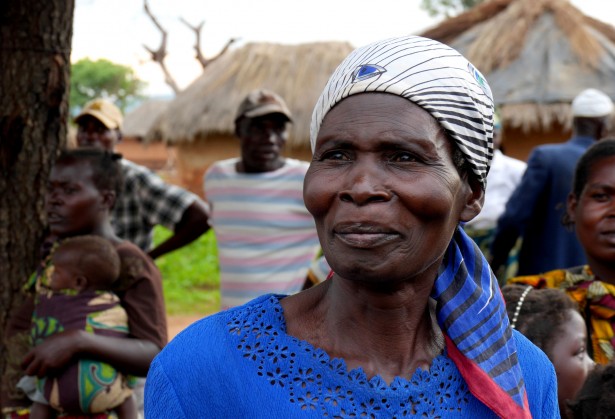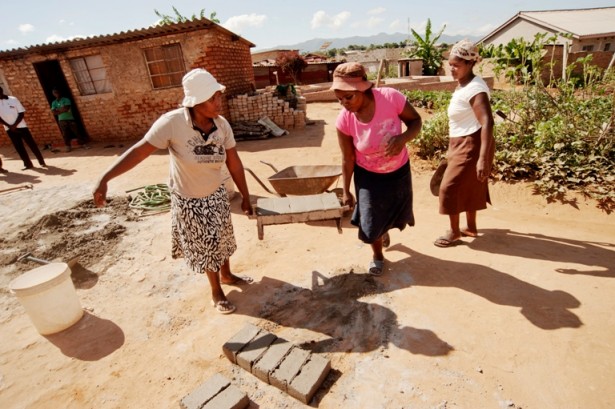

| Online: | |
| Visits: | |
| Stories: |

| Story Views | |
| Now: | |
| Last Hour: | |
| Last 24 Hours: | |
| Total: | |
Ghana’s Queen Mothers revive grassroots women empowerment

Queen Mother Zamele Kwenu in Ferro Village in Ghana’s Upper East district. (WNV / Caleb Chirano)
Ghana’s Queen Mothers used to sit next to kings and hold immense community influence, but with the advance of colonial rule in the 1900s — and further exclusion by the new government following independence in 1957 — their authority began to disappear. Today, the Queen Mothers are experiencing a resurgence, as they partner with ordinary community women in rural northern Ghana to revive girls’ education, establish female land ownership, stop female genital mutilation and provide affordable access to sanitary wear for poor women.
Queen Mothers are called “Pognamin,” a ceremonial term in Dagbani — one of Ghana’s widely used dialects — that means “one who sits with kings.” In reality, these queens no longer sit with kings, but rather ordinary community women to create an inspiring grassroots movement of over 10,000 mothers across Ghana.
In the country’s vast, rural and poor Upper East district, 80 ordinary mothers have united to form the “Upper Queens Challengers.” This is an 80-women strong community movement of common mothers and 30 Queen Mothers that moves from school to wedding to mosque to church to market place, organizing seminars against female genital mutilation. According to the Ghana Ministry of Health, this destructive practice disrupts the education and lives of approximately 2,000 girls every year in northern Ghana.
“Female genital mutilation pains our girl children here,” said Asifa Monso, a 53-year-old Queen Mother who partners with 30 women in the district’s Ferro Village. “It’s ancient tradition, but we feel it is now outdated and completely horrible. We partner with police to rescue girls from illegal circumcision schools. We have built one shelter to house and protect orphaned girls who run away from these schools.”
Meanwhile, in Chanz Village, located in the eastern Volta district on Ghana’s border with Togo, this movement of ordinary mothers and former queens are joining hands with the U.K.-based NGO Save the Children to train community women who want to become midwives. In this district, a midwife is a critically important job because scores of girls under the age of 16 succumb to complications while trying to give birth outside of clinics.
Angeline Sisskou, 37, is not a queen mother, but she is among a dozen ordinary women in the village who have completed an eight-month course to become village midwives.
“With our local queen mother we approached Save the Children to get funding for the midwife course in July 2015,” she explained. “We are now 12 qualified community midwives in this district. The Queen Mother trained with us too. Hospitals on average are 20 kilometers away from the major populated villages. Underage girls here give birth in carts or kitchens. They can’t afford the clinic’s $40 maternity fee. As community midwives, we intervene for free. We have supervised six births in January 2016 alone.”
The main challenges for women in rural north Ghana are mainly economic. Men make all the supreme decisions on land, children and water resources.
According to Didymus Besyl, an economist with the Ghana Institute of Management and Public Administration, only 12 percent of rural women in northern Ghana have title deeds to farmland. “Women do all the digging of land for crops, raising of livestock, harvests and storage of food,” he said. “But when their husbands die, male relatives kick the women off the land and confiscate it. Anecdotal evidence suggests that female community poverty is 26 percent higher than that of males on average.”
This is where Sheila Jauve, a 56-year-old Queen Mother is campaigning to change laws and attitudes. Sheila has partnered with 120 women in Hassa Village to form the Hassa Network for Women Intiative.
“In our village of 3,000 inhabitants we have successfully petitioned ruling chiefs to make sure no widow is kicked off her land by male relatives without a court order,” Sheila explained. “We are happy the police support our program, and we have returned 44 female widows and their children to the lands of their husbands since 2013. It’s a small victory, but highly significant.”

A women-run brick making factory in Ferro Village. (WNV / Caleb Chirano)
The revival of the Queen Mothers’ ceremonial authority is inspiring ordinary girls to do more in societies that were previously male dominated and highly patriarchal.
At Katta High School in the Volta district, 55 female students are working with Queen Mothers to borrow space from local chiefs and begin income generating projects. According to the head of the economic research unit at Ghana Statistical Services, 10 percent of girls in Volta district drop out of high school because they cannot afford the $70 annual tuition fees for exams.
“I take care of my two younger brothers who are 13 and 15,” explained 20-year-old Sarah Amuh, whose parents died from malaria five years ago, at which point she was forced to abandon school. “In 2014 our local Queen Mother organized us into 55 orphaned girls and negotiated for land to rent from local chiefs.” They now keep bees and chickens, and sell the cakes and soap they make.
“Our fortunes have improved,” she said. “I can afford to rewrite the school examinations in 2016. It is not only income generating projects we do. We also lead community sessions every weekend teaching other young girls and boys on the perils of drinking, early marriages and adjusting to life after prison.”
While there is still much work that needs to be done — particularly when it comes to getting the government to match the enthusiasm of the grassroots efforts with funds for programs that safeguard women’s health, education and food security — it’s clear that the work of the Queen Mothers and their partners is having an impact. Queen Mother Asifa Monso says respect for women’s rights is on the rise in rural Ghana. “Attitudes are changing. This is refreshing.”
People-powered news and analysis
Source: http://wagingnonviolence.org/feature/ghanas-queen-mothers-revive-grassroots-women-empowerment/


